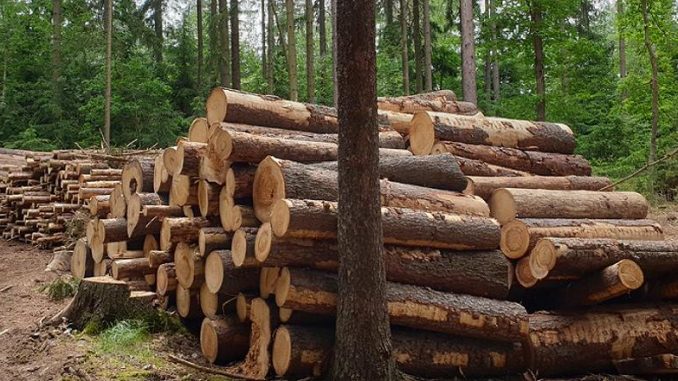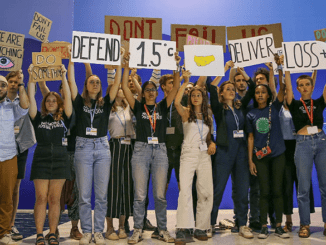
BRUSSELS, Belgium, June 21, 2021 (ENS) – More than 90 environmental and consumer groups have appealed to the European Parliament to postpone their judgement on sustainable finance rules that would allow logging and the burning of trees to be counted as green investments.
In an open letter, organizations including BirdLife Europe, WWF, Greenpeace, and the European Consumer Organisation, BEUC, call on the 705 Members of the European Parliament to suspend scrutiny of the EU Commission’s “Taxonomy of sustainable investments” until the Renewable Energy Directive and the EU Forest Strategy are disclosed later this year.
The EU Taxonomy is a tool to help investors, companies, issuers and project promoters navigate the transition to a low-carbon, resilient and resource-efficient economy.
The Taxonomy sets performance thresholds, called “technical screening criteria,” for economic activities which:
• make a substantive contribution to one of six environmental objectives
• do no significant harm to the other five, where relevant;
• meet minimum safeguards such as the OECD Guidelines on Multinational Enterprises and the UN Guiding Principles on Business and Human Rights.
The EU’s Taxonomy Regulation, agreed at the political level in December 2019, creates a legal basis for the EU Taxonomy. The regulation sets out the framework and environmental objectives for the Taxonomy, as well as new legal obligations for financial market participants, large companies, the EU itself and its 27 Member States.
The Taxonomy Regulation came into force in July 2020, after the Technical Expert Group on Sustainable Finance, TEG, submitted its report in March 2020.
The Delegated Act released in December presented details on how authorities and the market can comply with the regulation, by setting out which economic activities and sectors can be classed as sustainable. The Delegated Act is now subject to approval by the European Parliament and Council.

The conservation groups argue that the European Commission’s Delegated Act “greenwashes unsustainable logging and bioenergy by stating that forestry, logging trees, and bioenergy, burning trees and crops for energy, make a ‘significant contribution to climate mitigation’ and do ‘no significant harm’ to biodiversity,” the groups argue.
As many criteria in the EU Taxonomy are linked to existing legislation on forestry and bioenergy, the organizations are urging MEPs to use upcoming reviews of these policies and laws to strengthen the laws’ provisions, align them with climate science, and restore the Taxonomy’s scientific credibility.
Writing for BirdLife, Honey Kohan explains the groups’ position – that the Delegated Act published by the European Commission contains “grave mistakes and is not fit for purpose.”
“BirdLife will continue to call on the European Parliament and the Council to reject the Delegated Act,” writes Kohan, “so the Commission can correct these mistakes and adopt an Act that only labels activities actually good for the environment as such.”
Following the release of the European Commission’s draft Delegated Act, an even larger coalition of influential NGOs, 131 groups in total, outlined the 10 most important areas that must revised to produce a taxonomy that is based on scientific evidence, supports fully sustainable economic activities, accelerates the shift from unsustainable to sustainable activities, and truly reduces the risk of greenwashing.
To see the full report of the 131 groups, click here.
The 10 Areas in Need of Revision Are:
A . Economic activities that were rightly excluded and should not be reincluded in the Taxonomy
- Fossil fuels: coal, oil and gas
Note on Nuclear Power: Nuclear power, rightly excluded by the Technical Expert Group on Sustainable Finance (TEG) from its report which laid the groundwork for the Taxonomy, but nuclear power has been accorded a special process by the EU following strong corporate lobbying. “This process creates a dangerous precedent. We are opposed to the inclusion of nuclear power in the taxonomy,” the NGOs said.
- Incineration
The draft Delegated Act (DA) rightly follows the Technical Expert Group recommendation to exclude waste incineration as it undermines upper-tier activities of the EU waste hierarchy which are more protective of the climate, the groups said. But the Act has deleted the recommendation to exclude burning refuse-derived fuel (RDF) in cement plants. The TEG gave this advice on the basis that “co-incineration of RDF has significant impacts on health and environment due to the polluting nature of the associated emissions and may undermine waste minimisation efforts.” The groups argue that the TEG’s expert opinion should be followed.
B. Economic activities to be improved with tighter criteria
- Bioenergy
The draft Delegated Act accepts that all forest biomass – wood sourced directly from forests – may be burned as feedstocks and that almost any activity that is aligned with the flawed Renewable Energy Directive is counted as sustainable, including the use of dedicated cropland.
This is unscientific, the groups maintain. “It contradicts all recent authoritative scientific research and the Commission’s own impact assessment on bioenergy, which stated that the idea that forest biomass can mitigate climate change is extremely problematic and acknowledged that demand for forest biomass is hindering EU forests’ ability to act as a carbon sink.”
Separately, 100 civil society groups have called for an end to subsidies and other incentives for burning all forest biomass.
The groups urge that the European Commission reverse its decision to classify the burning of all forest biomass for energy as sustainable and exclude from eligibility all bioenergy feedstocks that increase emissions compared to fossil fuels, including purpose-grown crops.
- Hydropower
The draft DA does not follow the Technical Expert Group recommendation that “construction of small hydropower (<10MW) should be avoided” considering the massive negative impacts of small installations on freshwater biodiversity.
In addition, 150 NGOs have also asked that no new hydropower be built in Europe, given the already excessive number of hydropower plants which disrupt freshwater ecosystems and the negligible benefit of new hydropower in transitioning to carbon neutrality.
- Forestry
The Taxonomy relies on sustainable forest management, which entails cutting less than the annual growth and giving equal consideration to environmental and social aspects, as well as economic ones. But, the draft Delegated Act would allow activities such as short-term rotation below 20 years, which is not climate-neutral due to the carbon released and because it usually employs the wrong type of trees. The groups argue that forestry operations should not qualify if they reduce forests’ carbon sink function, lead to irreversible forest degradation or to biodiversity loss.
“It is important to protect existing natural forests, restoring and enriching biodiversity as well as the carbon storage potential to generate forests that are resilient,” they said.
- Inland water transport
For transporting passengers, the draft Delegated Act ignores the Technical Expert Group’s threshold for vehicles with tailpipe emission intensity of 50 g CO2/km to be eligible until 2025, without setting norms that would exclude conventional engines. It introduces a limitation of 50 percent of the fuel mass that allows the use of biofuels until 2025. The groups argue that this is “completely misaligned with the Paris Agreement and risks encouraging business as usual in the water transport sector being counted as sustainable. There is a real risk of greenwashing.”
- Biofuels and biogas use in transport
The draft Delegated Act weakens the Technical Expert Group’s criteria by making all biofuels and biogas from feedstocks in Annex IX of the Renewable Energy Directive II eligible, and by proposing that all biogas, including food and feed, should be made eligible for the Taxonomy.
The Taxonomy should, at a minimum, revert to the TEG’s recom mendations on biofuel and biogas eligibility and possibly improve them by extending the blanket exclusion of food and feedstock also to biogas.
This inclusion is made even more unacceptable as global hunger and malnutrition rise, notably because of the climate crisis, and are further compounded by the ongoing pandemic, the groups point out.
- Hydrogen
Positively, the draft DA has improved the TEG’s emissions threshold. However, the Commission should include an explicit point excluding hydrogen manufactured with fossil fuels and/or non-renewable power from the taxonomy.
C. Economic activities to be removed from the EU sustainable taxonomy
- Sea and coastal water transport
In breach of the established process that relies on the opinion of technical expert groups, these highly polluting activities have been introduced without consulting stakeholders. In addition to this unacceptable method comes a requirement to meet extremely low Energy Efficiency standards (EEDI) that allow, essentially, to label all ships as ‘environmentally sustainable’ until 2025. This activity should not be included in the taxonomy until it is properly assessed by the EU Platform on Sustainable Finance, as planned.
- Livestock
The environmental and consumer groups recommend not including livestock activities in the taxonomy for the time being as it is difficult and complex to assess its greenhouse gas emissions.
The livestock industry as a whole is highly carbon-intensive, polluting, and linked to deforestation. In addition, there are animal welfare and human health concerns. Including livestock in the taxonomy risks slowing down the transition to a more sustainable, plant-based diet, as required in Paris-compliant climate scenarios. Organic livestock could be an exception and could be included.
If this is judged impossible, the draft Delegated Act should at least refocus on reduction of herd sizes rather than the technical solutions, such as adjusted feeding of livestock, which it currently favors, the groups recommend.
Featured image: Logs cut from a forest possibly infested with bark beetles, Central Bohemia, Czech Republic, June 12, 2021 (Photo by Jan Gelebrandt)
© 2021, Environment News Service. All rights reserved. Content may be quoted only with proper attribution and a direct link to the original article. Full reproduction is prohibited.



